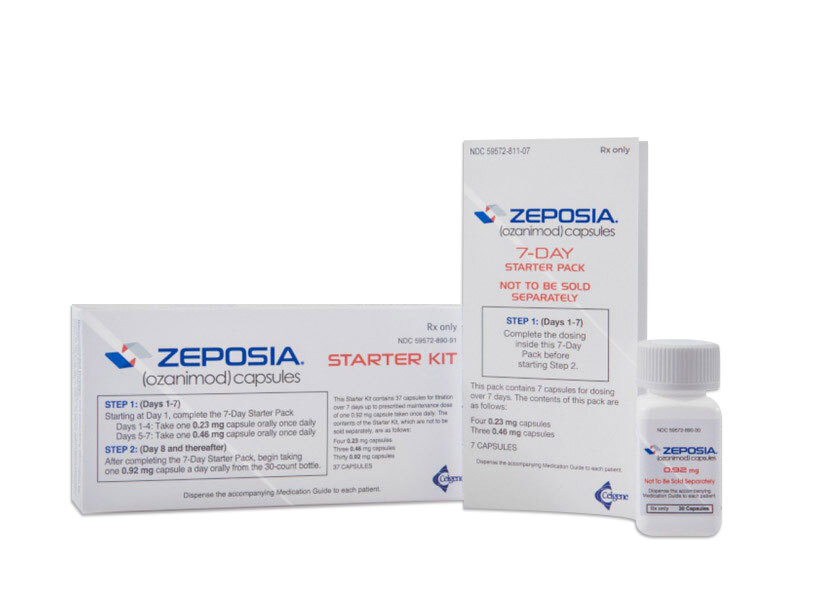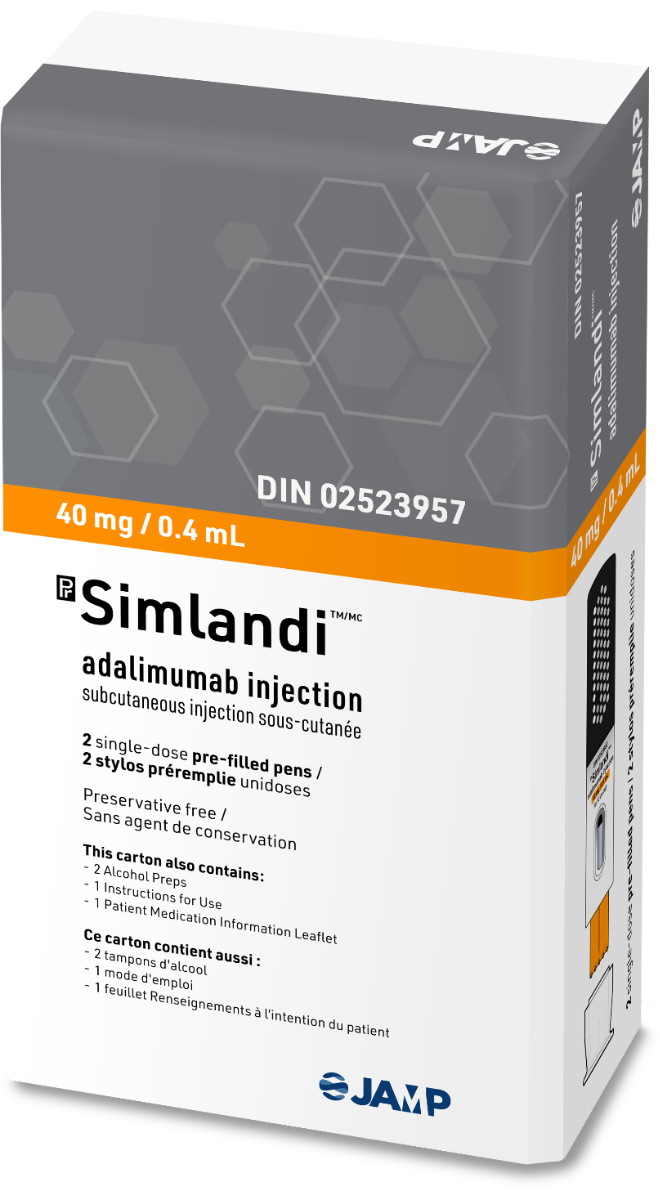Zeposia (ozanimod) vs Simlandi (adalimumab-ryvk)
Zeposia (ozanimod) vs Simlandi (adalimumab-ryvk)
Zeposia (ozanimod) is an oral sphingosine 1-phosphate receptor modulator used for the treatment of relapsing forms of multiple sclerosis (MS) and for moderately to severely active ulcerative colitis. Simlandi (adalimumab-ryvk), on the other hand, is a biosimilar to adalimumab, an injectable tumor necrosis factor (TNF) blocker used to treat a variety of autoimmune conditions such as rheumatoid arthritis, psoriatic arthritis, ankylosing spondylitis, and Crohn's disease. When deciding between Zeposia and Simlandi, it is important to consider the specific condition being treated, the route of administration preference (oral vs. injection), and the mechanism of action, as these medications are used for different indications and work in distinct ways within the body.
Difference between Zeposia and Simlandi
| Metric | Zeposia (ozanimod) | Simlandi (adalimumab-ryvk) |
|---|---|---|
| Generic name | Ozanimod | Adalimumab-ryvk |
| Indications | Multiple sclerosis, Ulcerative colitis | Rheumatoid arthritis, Psoriatic arthritis, Ankylosing spondylitis, Crohn's disease, Ulcerative colitis, Plaque psoriasis |
| Mechanism of action | Sphingosine 1-phosphate receptor modulator | Tumor necrosis factor (TNF) blocker |
| Brand names | Zeposia | Simlandi |
| Administrative route | Oral | Subcutaneous injection |
| Side effects | Upper respiratory infection, Liver enzyme elevation, High blood pressure | Injection site reactions, Upper respiratory infections, Headache, Rash |
| Contraindications | Recent myocardial infarction, Unstable angina, Stroke | Active tuberculosis, Infections like sepsis, Opportunistic infections |
| Drug class | Sphingosine 1-phosphate receptor modulator | Monoclonal antibody |
| Manufacturer | Bristol Myers Squibb | Amgen |
Efficacy
Zeposia (Ozanimod) for Ulcerative Colitis
Zeposia (ozanimod) is a medication that has been approved for the treatment of adults with moderately to severely active ulcerative colitis (UC). As a sphingosine 1-phosphate receptor modulator, ozanimod works by reducing the ability of lymphocytes to exit lymph nodes, thereby lowering the number of lymphocytes available in the gastrointestinal tract to cause inflammation. Clinical trials have demonstrated the efficacy of ozanimod in achieving clinical remission in patients with UC. In the pivotal Phase 3 trial, True North, a statistically significant proportion of patients treated with ozanimod achieved clinical remission compared to placebo. The trial also showed that ozanimod was effective in maintaining remission in patients who responded to the treatment.
Simlandi (Adalimumab-ryvk) for Ulcerative Colitis
Simlandi (adalimumab-ryvk) is a biosimilar to the reference product adalimumab and is used for the treatment of several inflammatory conditions, including moderately to severely active ulcerative colitis. Adalimumab is a tumor necrosis factor (TNF) blocker that works by inhibiting the action of TNF, a substance in the body that can cause inflammation and lead to immune system diseases. The efficacy of adalimumab in ulcerative colitis has been established through clinical studies that demonstrated its ability to induce and maintain clinical remission in patients who have not responded adequately to conventional therapies. As a biosimilar, Simlandi is expected to have similar efficacy and safety profiles as the reference product, although specific clinical trials for Simlandi would be referenced to confirm its efficacy in UC.
Comparative Efficacy and Considerations
When comparing the efficacy of Zeposia and Simlandi for ulcerative colitis, it is important to consider the mechanism of action, the patient's history of response to other treatments, and their overall health profile. Both medications have shown efficacy in inducing and maintaining remission in UC, but they work through different pathways in the immune system. Therefore, the choice between these medications may be influenced by individual patient factors, including previous treatment history and potential side effects. Additionally, the long-term efficacy and safety of these treatments continue to be studied to provide further guidance on their optimal use in UC management.
Conclusion
In conclusion, both Zeposia (ozanimod) and Simlandi (adalimumab-ryvk) have been shown to be effective treatments for moderately to severely active ulcerative colitis. Zeposia offers a novel mechanism of action as an S1P receptor modulator, while Simlandi, as a biosimilar to adalimumab, offers a continuation of the established efficacy of TNF inhibition in UC. The choice of treatment should be tailored to the individual patient based on clinical evidence, patient preference, and healthcare provider judgment, taking into account the unique attributes of each medication and the patient's specific clinical scenario.
Regulatory Agency Approvals
Zeposia
-
European Medical Agency (EMA), European Union

-
Food and Drug Administration (FDA), USA

-
Health Canada

-
Therapeutic Goods Administration (TGA), Australia

Simlandi
-
Food and Drug Administration (FDA), USA

Access Zeposia or Simlandi today
If Zeposia or Simlandi are not approved or available in your country (e.g. due to supply issues), you can access them via Everyone.org.
How it works

Make an enquiry
Choose the medicine you want to buy, answer a couple of questions, and upload your prescription to speed things up. We’ll get back to you within 24 hours.


Make an enquiry
Choose the medicine you want to buy, answer a couple of questions, and upload your prescription to speed things up. We’ll get back to you within 24 hours.


Breeze through the paperwork
We'll guide you through the required documents for importing unapproved medicine, ensuring you have all the necessary information.


Get a personalized quote
We’ll prepare a quote for you, including medicine costs and any shipping, administrative, or import fees that may apply.


Receive your medicine
Accept the quote and we’ll handle the rest - sourcing and safely delivering your medicine.

Some text on this page has been automatically generated. Speak to your physician before you start a new treatment or medication.
Let's talk
If you have any questions, call us or send us a message through WhatsApp or email:
Contact us




